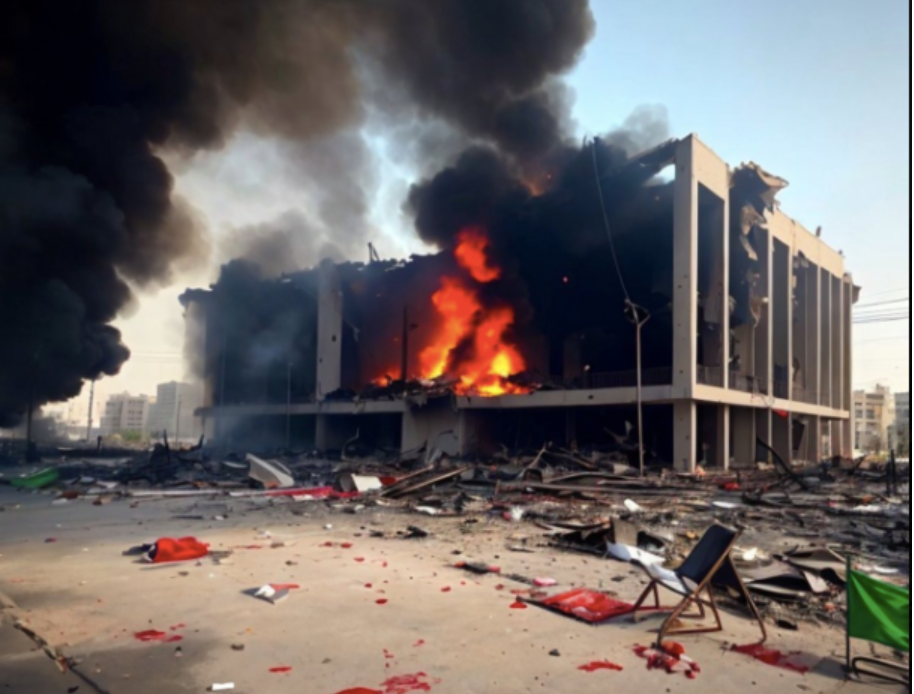Despite their current limitations – such as voice-cloning models that struggle with convincing Sudanese dialects – deepfakes have become a common tool on Sudan’s alternative battlefield: social media.
In April 2024, a fake image circulated on social media claimed that the Sudanese Armed Forces (SAF) had bombed Al-Jazeera University in Wad Madani city. The image, showing a building in flames, went viral on Facebook, deceiving even prominent political figures who shared it widely.
This incident is not an anomaly. As the war between Sudan’s army and the paramilitary Rapid Support Forces (RSF) rages on, social media has become a battleground where deepfakes are routinely used to spread false information, manipulate narratives, and garner support. This trend presents a severe threat to a nation already in need of a robust information ecosystem.
AI-generated fake videos have been part of the disinformation campaign since the war’s early days. In August 2023, Daily Mail identified a deepfake video featuring the U.S. ambassador to Sudan, falsely stating that America had a plan to reduce Islam’s influence in the country.
In October 2023, a BBC investigation exposed an AI-driven campaign impersonating Sudan’s former leader, Omar al-Bashir, which amassed hundreds of thousands of views on TikTok.
In March 2024, an account on X (formerly Twitter) belonging to a TV and radio presenter shared an AI-created recording purportedly of the head of the Sudanese Armed Forces ordering civilian killings, deployment of snipers, and the occupation of buildings. This recording garnered 230,000 views and was shared by many, including notable Sudanese politicians.
In September 2023, some Sudanese individuals with no clear political motives began using deepfake technology for satire. For example, a song supporting the Sudanese Armed Forces was altered into a deepfake, making it appear as though RSF leader Mohamed Hamdan Dagalo, alias Hemedti, was singing along with a high-ranking officer. While this was recognized as humorous, other such content has dangerously morphed into disinformation.
In March 2024, a fake recording surfaced, supposedly revealing a secret meeting between RSF militia leaders and members of the Freedom and Change coalition plotting a military coup. Although the recording was proven false, it was shared by well-known journalists and even aired on national TV before being taken down. Obai Alsadig, who created the recording, explained that his intent was sarcastic and meant to highlight how easily such fakes could be made.
Deepfake technology has been weaponized by various factions in Sudan. Supporters of the Sudanese Armed Forces, as part of a psychological warfare campaign, falsely claimed that authentic recordings of Hemedti were AI-generated, suggesting he had died. Independent analysis, however, confirmed the recordings were legitimate.
Efforts to counter deepfake disinformation are ongoing. Beam Reports, a fact-checking organization based in Khartoum and verified by the International Fact-Checking Organization, has been tracking and analyzing deepfakes in Sudan. “While there is use of deepfake technology on social media for misleading purposes, we cannot say its use has increased significantly in recent months,” Beam Reports explained. They also noted that AI-generated audio attributed to people involved in Sudanese affairs has been on the rise.
In a May 2024 UNESCO seminar, Beam Reports highlighted the challenges posed by AI in spreading disinformation. “The absence of on-the-ground reporting is leading to the increase of mis/disinformation,” UNESCO stated, adding that generative AI is exacerbating the problem by producing and amplifying false information and hate speech.
Individual activists with technical expertise, such as UK-based Sudanese fact-checker Mohanad Elbalal, have also stepped up to verify viral content. “If I suspect a clip is a deepfake, I use reverse image search to find similar templates or look for identifying features like fake news logos,” Elbalal explained.
The lack of access to effective detection tools remains a significant challenge in combating deepfakes. “While inspiring research is underway, most of these tools are out of reach for the general public and require advanced technical knowledge,” said Shirin Anlen, a media technologist at Witness. Publicly available tools are often complex, lacking transparency, and prone to false positives, which further complicates their use.
The threat posed by AI-generated fake news in Sudan is likely to intensify as the technology advances. According to Sudanese AI researcher Mohamed Sabry, “So far, much of the AI-generated deepfakes in Sudan can be identified because of their poor quality, but this will change if more sophisticated technology is used.” While voice-cloning models currently struggle with Sudanese dialects, advancements in AI could eventually overcome these limitations, making the fakes harder to detect.
The widespread skepticism fueled by deepfakes is also leading to a “liar’s dividend,” where politicians deny genuine recordings by claiming they are fake. In June 2023, Sudanese politician Mubarak Ardol denied the authenticity of a voice recording attributed to him, claiming it was generated using AI software.
Social media platforms are trying to curb the spread of deepfake disinformation, but enforcement remains weak in Sudan. YouTube, for instance, prohibits “technically manipulated content that misleads users and may pose a serious risk of egregious harm.” The platform also requires creators to disclose when content has been altered and adds transparency labels to help viewers understand the context. Yet, this harmful content often remains accessible, revealing gaps in moderation, particularly in regions like Sudan.




